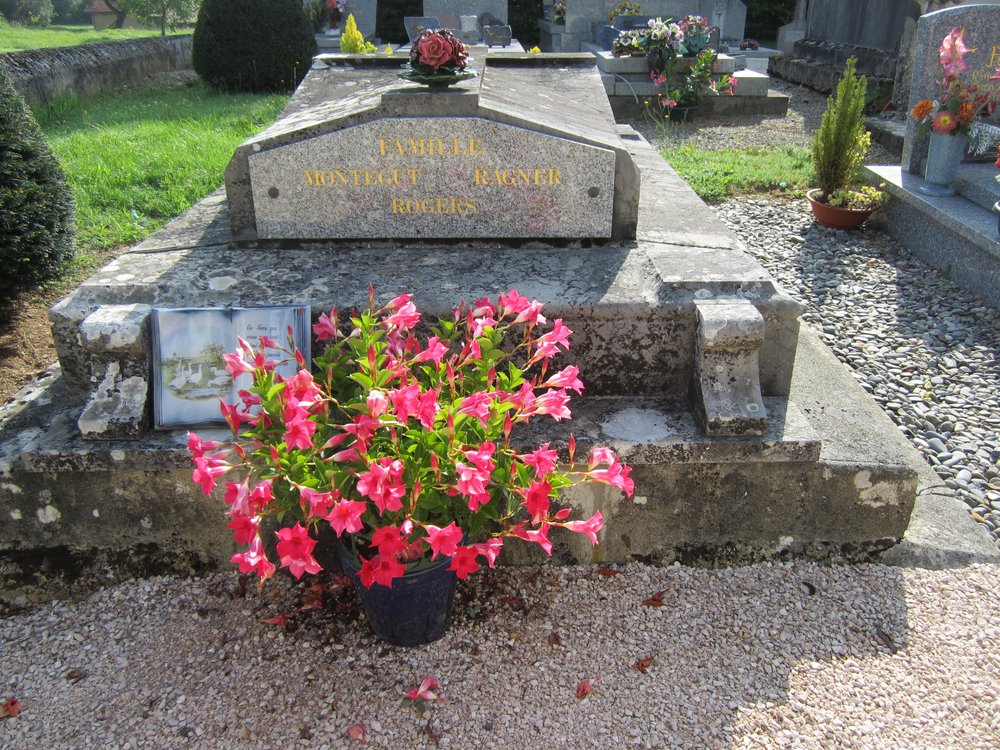
I sit in front of our family tomb and read the names of those inside: Montegut, Ragner, Rogers. Montegut is my great grandfather. Ragner is my grandmother (though not my grandfather, who was buried near Pittsburgh) who grew up in Estampes, then married a Swede born in the States. Rogers is my mother and father, whom we buried in 2005, then 2007. I remember when we added the granite plaque with the name Rogers, the shock of seeing my own name, of realizing this is a place I will rest as well.
I leave the cemetery, surprised I am not crying. It’s hard to take stock of when intense grief subsides, but somehow, miraculously it has. Time helps, is what friends told me, though I never believed them. It feels miraculous to be on this side of sadness.
And yet time has not taken the edge off of Odette’s grief when she tells me, as she does every summer, about when her father died. She was fourteen. It was 1943. Her father fell down the stairs, was rushed to the hospital. It was a ruptured intestine, is what she guesses now. Peritonitis. They operated in Tarbes, then brought him home. Five days later he was dead. Like that. Every time she tells the story she folds into tears.

I walked past Elise’s, then past the Arnou’s, whom I still think of as the Parisians though they moved to Estampes in the early 70s. Then I was above the village, looking down on a sweep of fields. In front of me were woods, dense with oak and locust trees. I was, of course, looking for birds. A nuthatch. A brown creeper. I spied a flash of blue and thought the large bird might be a jay. But it was pretty quiet in the woods, and the birds felt skittish compared to the birds at home.
I saw a few cars parked by the side of the dirt road. These were the cars of people hunting mushrooms, cepes, the large boletes, and girolles. In my early twenties I lived in the house in Estampes for a long stretch 
A car approached and the driver came to a halt, turned off the engine and hopped out to shake hands with me. He was older, wearing blue work pants held snug with a belt, and a checked shirt. He was a slender man, his forearms strong and tanned. I did not recognize him, which surprised me.
How is your hunt? he asked.
I explained I was hunting for birds, not mushrooms. And I realized as I said this that a walk without a hunt—birds, mushrooms, flowers—isn’t as fun as one where I am looking for something. The hunt provides direction, small destinations.
What sort of birds, he wanted to know.
Anything, I said, I was from the States, so anything would please me. This was completely true.
Oh, the Americans, he said. You’ve been doing work on your house.
Right.
He told me about the buzzard up the hill. Some farmers don’t like the buzzard, but it’s a good bird, he said.
How was your hunt? I asked.
He said that two weeks ago there was a lot of rain, perfect for mushrooms. They were sure to have a good crop. But then it rained again. And everything went a bit soft. The slugs were having a good time of it, he said. We laughed. Then off he drove and I continued uphill. The woods were calm, the light speckling through the trees. From time to time there was an opening, a small field where farmers grazed their cows. It was humid for the southwest of France, and I could feel the weight of the sun as it rose higher in the sky.
Two men walked toward me. They were both about my age, and carried wicker baskets. The one man looked familiar.
“You are a Ricourt,” I said. It was a good guess as it seems that half of the village are Ricourts, the wealthy baker family.
Oh, he said, and took off his hat, leaning in to kiss me. I could feel the sweat from his cheek cool against my own as we greeted each other.
